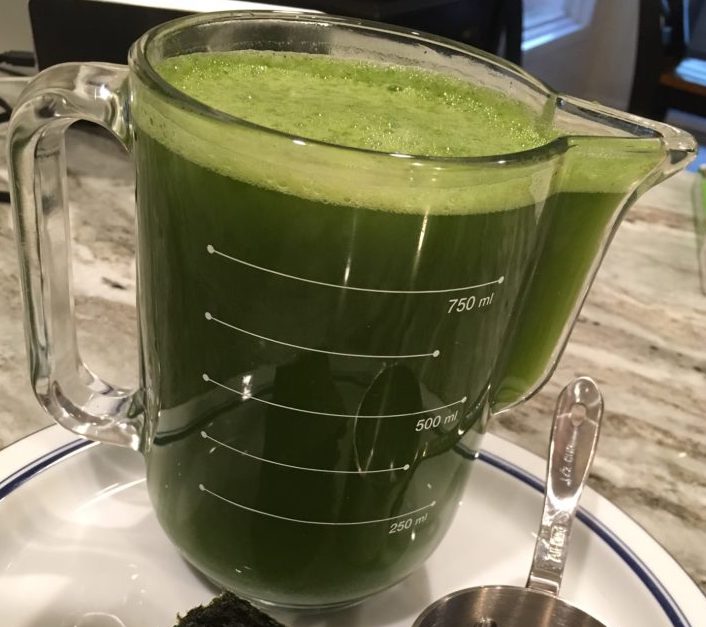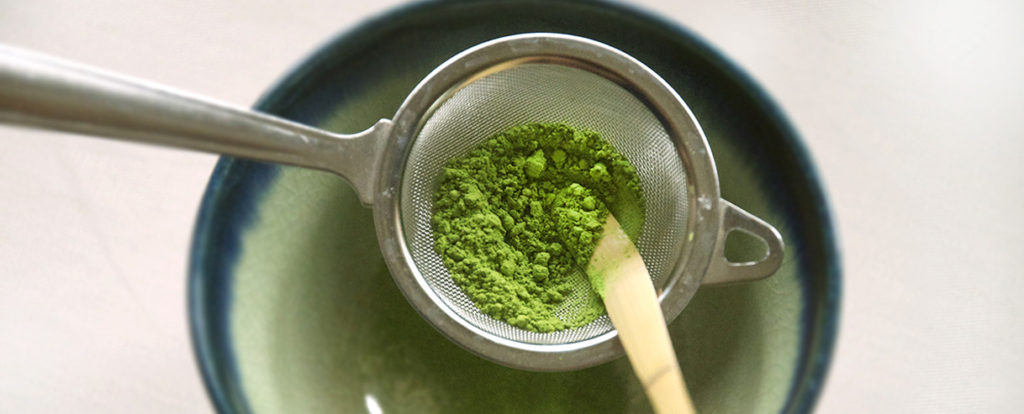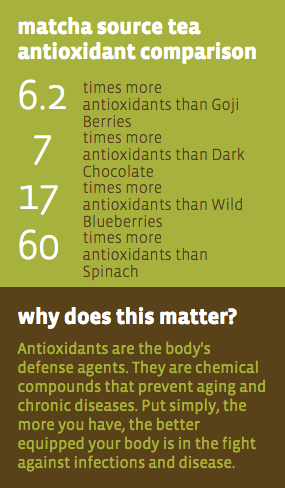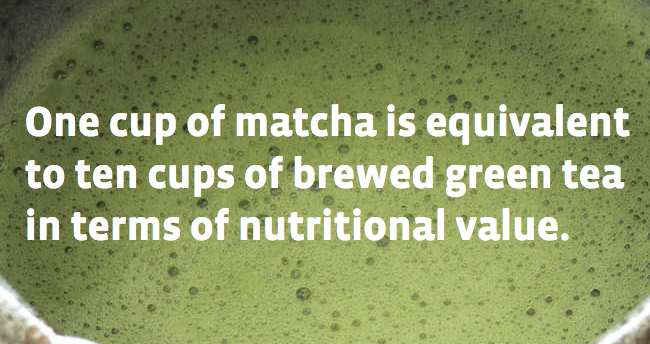The title of this blog post is a strong one, I admit. As a nutritionist and long time matcha green tea consumer, it is my wish that everyone harness the healthful benefits of matcha for themselves.
Almost every morning I hydrate my body with nearly four cups (I literally drink it out of a measuring cup) of organic green matcha tea. It’s a nutrient-dense and cleansing way to start the day.

Matcha is a green powder similar to, yet different from, other green powders such as wheatgrass powder, spirulina powder, or chlorella powder.

Matcha powder comes from green tea leaves that have been dried and then pulverized into a very fine powder. Wheatgrass powder comes from dried young grass, spirulina powder comes from dried blue-green algae, and chlorella powder comes from dried green algae. These are all similar powders in that they are chock-full of beneficial chlorophyll yet each have different nutrient profiles.
Chlorophyll is the green pigment found in the chloroplasts of algae and plants which allows them to absorb energy from sunlight. It is a phytonutrient that oxygenates and detoxifies the blood and is rich in enzymes and high in amino acids. It alkalizes the body, is anti-inflammatory, and is an antioxidant. It has been shown to repair damaged DNA and speed up the healing process of wounds. Read more about the many benefits of chlorophyll here.

Did you know that when animals, humans included, consume chlorophyll they can derive energy directly from sunlight which means, after all, that humans can photosynthesize too?
I personally favor matcha over these other green powders for daily use because I can drink it as a pleasant-tasting tea. For me wheatgrass, spirulina, and chlorella powders are best enjoyed added to a smoothie which I might or might not drink every day.
I drink matcha plain with just hot water. Some people, at first, find matcha to taste fishy, ocean-y, or similar to seaweed. I personally do not experience this probably because I have been drinking it since 2008 and I’m fully acclimated to the taste which I enjoy. I also eat nori seaweed on a regular basis so matcha does not taste like nori to my taste buds which are well-acquainted with seaweed.
If you need to sweeten matcha or make a latte with it to work it into your daily routine, be sure to choose a nutrient-dense and low-glycemic sweetener like date nectar, raw dark agave, molasses, or pure maple syrup. The tip here is to use liquid sweeteners sparingly and make sure they are dark in color to indicate mineral content.

For a latte, pair the sweetener with an unsweetened plant milk of your choice. Plant milk options are preferable as homemade versions if you enjoy spending time in your kitchen. Search online for recipes which require essentially a blender, nuts or grains, water, and cheesecloth for straining.
Another option is to drink plain matcha (no sweetner or milk) iced to chill out the flavor. I advise NOT purchasing matcha from Starbucks if you do not wish to drink a load of powdered sugar with your matcha powder.

The superpower of matcha resides in the Epigallocatechin gallate (EGCG) which is a type of natural phenol and antioxidant called a catechin. EGCG levels are highest in green tea but are found at lower levels also in white and black teas. Trace amounts are found in apple skin, plums, onions, hazelnuts, pecans, and carob powder.
- When you drink matcha you ingest the entire leaf and receive 100% of the nutrients of the leaf (Dr. Greger considers matcha to be a whole plant food!)
- Matcha powdered green tea has 137 times more antioxidant content than regularly brewed green tea.
- One cup of matcha = 10 cups of regularly brewed green tea in terms of nutritional content
Personally I order organic Morning Matcha from Matcha Source. Be sure to follow that link to see a video of me making my matcha and scroll to the bottom of the post for a coupon code for ordering. As mentioned, I have been drinking this very brand of matcha since 2008. I am pleased with the quality and customer service and I enjoy supporting a small, woman-owned company.
I hope you give matcha green tea a try. If you are health conscious and already like tea or are aiming to reduce coffee consumption, matcha green tea just might be an excellent option for you. With its dense nutrient profile, it’s a healthful choice for everyone!

{ 2 comments… read them below or add one }
Where could I find decaffeinated matcha tea? I cannot tolerate caffeine.
Do an internet search for “decaffeinated matcha” as I can not recommend a brand since I have never consumed it without the natural low level of caffeine. Good luck!